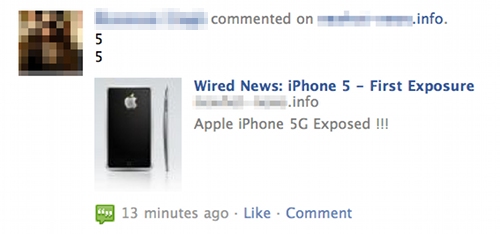Another Facebook scan is doing the rounds these days, this time attempting to take advantage of users’ interest in the yet un-announced iPhone 5.
The scam is a simple one to spot, if you know what you’re looking for. It all starts to go wrong when someone clicks what they think is a legitimate link on one of their friends’ Wall. This particular link claims to lead to the ‘First Exposure’ of the iPhone 5, and a new webpage is opened.
The next page presents the unwitting user with a CAPTCHA window to fill in, presumably to check that they aren’t a robot. Unfortunately as soon as the CAPTCHA is completed, a fake message appears on your own Wall saying you commented on a link. Someone clicks it, and the whole process repeats.
As for what the bad guys get out of it, after filling in the CAPTCHA users are taken to a survey to fill in, which presumably someone gets paid for.
This isn’t the first time such a scam has hit Facebook. Earlier in the year a similar iPhone 5 link was doing the rounds, though this one is a slightly modified version of the original. Links purporting to take users to a Justin Bieber page have also been used to entice clicks. The whole process is known as ‘linkjacking’ according to security firm M86, via CNET.
At the heart of all these Facebook scams lies the same principal: a way for the scammers to make money by tricking users. Survey scams have been working quite well, so it makes sense that scammers would begin focusing their efforts with pay-per-install affiliate programs.
Facebook recommends people don’t click the links, even if they appear to be from people you know.
You can follow us on Twitter or join our Facebook fanpage to keep yourself updated on all the latest from Microsoft, Google and Apple.


